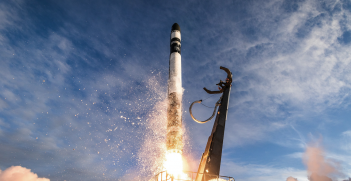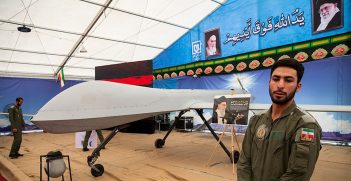UN General Assembly 2018: What to Expect from Trump and Others

Donald Trump’s words on Iran and North Korea stole the show during last year’s UNGA. This year, is constructive diplomacy possible?
This year’s high-level session of the United Nations General Assembly, which will see world leaders gather in New York later this month, is very unlikely to resolve the world’s problems. Could it actually make some of them worse?
The “UNGA” jamboree is always a bit of a circus. Presidents and prime ministers reel off their country’s achievements and grudges to overworked diplomats. But these meetings occasionally deliver concrete diplomatic results. In 2015, the Obama administration used UNGA to nudge leaders towards agreeing an ambitious climate change agreement in Paris by the end of the year.
It is hard to see the United States shaping more big multilateral bargains through UNGA in the near future. Last year, President Donald Trump used his speech to fellow leaders to belittle the Iranian nuclear deal and threaten North Korea with total destruction. Fellow leaders were genuinely shocked by his rhetoric and will be bracing for more of the same — or even worse — this month.
The US says that the president will make three main appearances, and his comments will likely dominate coverage of the event inside and outside the US. On Monday 24 September, Trump is expected to lead a discussion on global drug problems. This session may largely be aimed at a domestic audience worried by the US drug crisis as the midterms loom.
Then, on 25 September, the president will make his main speech to the assembly, before chairing a Security Council session on proliferation the next day. The US originally planned to focus the council session on the Middle East, risking a clash with allies, including France and the United Kingdom, over the Iranian nuclear deal. Presumably worrying Trump could look isolated, the US mission to the UN has broadened the agenda.
Nonetheless, Trump will surely have harsh words for Tehran in both UNGA and the council. It is harder to predict what he will say about the Korean situation. Since threatening Pyongyang at the UN last year, Trump has oscillated wildly between attacking and praising North Korean leader Kim Jong-un. With little real progress in nuclear talks, the president could use UNGA to ratchet up pressure on Kim — who will not be in New York unless he has a very, very big surprise indeed up his sleeve — or try to charm him with compliments.
Some of Trump’s other talking points are rather more predictable. He will almost certainly sternly defend Israel, although his administration’s new Middle East peace plan is still not ready for publication. He is also likely to tell other leaders that they need to do more about the ongoing breakdown of Venezuela, an issue he raised in his 2017 speech.
While Trump’s speeches, and any attendant tweets, will probably be the main attractions at the UN, a spike of violence in Syria threatens to overshadow proceedings. In 2016, the siege of Aleppo cast a pall over UNGA. This year, the imminent Syrian-Russian assault on Idlib could have an even bleaker effect, demonstrating the UN’s weakness in the face of a humanitarian catastrophe.
When talking about Syria, most leaders will likely concentrate their anger on Russia and Iran, taking some pressure off Trump. Russian president Vladimir Putin, who only rarely visits the UN, will not be on hand to listen. His Iranian counterpart, Hassan Rouhani, is scheduled to be in town, and bad news from Idlib could undercut his efforts to rebut American criticisms of the nuclear bargain.
Is any constructive diplomacy possible at UNGA? UN Secretary-General Antonio Guterres has set up a high-level meeting on peacekeeping operations on 25 September, at which leaders and ministers will promise to give stronger support to UN forces in places like South Sudan. This is a worthy initiative that has garnered the backing from both Western and non-Western contributors to blue helmet operations, but will take some time to bear fruit. There are also events on tuberculosis, the elimination of nuclear weapons and the centenary of Nelson Mandela’s birth.
Speakers at UNGA could also celebrate the fact that UN members negotiated their first ever compact on managing migration — plus a new text on assisting refugees — this summer, although this will be the focus of a December conference in Marrakesh. Souring matters, the Trump administration quit the migration talks in late 2017, and the issue is so sensitive in so many countries that leaders may not be too vocal about this new agreement.
Like all big political events, UNGA generates lots of side-events. These can often be more engaging than the main diplomatic show, especially after the first few leaders’ speeches. Here’s one, admittedly partisan, example: on 24 September, my colleagues at the UN University Centre for Policy Research will launch an important new online knowledge platform surveying the scourge of modern slavery.
This website, crafted with an alliance of other UN agencies and concerned groups, grew out of governments’ commitment to fight slavery as part of the 2015 Sustainable Development Goals. Those goals were another big diplomatic bargain to come out of UNGA that year. Like the assembly that endorsed them, they are sprawling and sometimes confusing. Still, it is worth noting that only three years ago, leaders were working through the UN to set out ambitious plans for cooperation.
This year, they will largely be waiting to see if Trump edges the world a little closer to a war in the Middle East or East Asia, or a little further away. It’s a bleak spectacle, but hard to ignore.
Richard Gowan is a senior fellow at the United Nations University’s Centre for Policy Research and the European Council on Foreign Relations.
This article was originally published on OpenCanada’s website. It is republished with permission.





